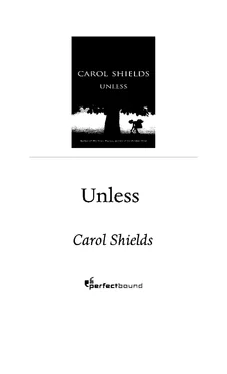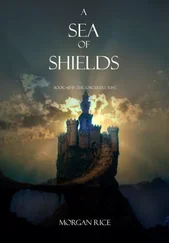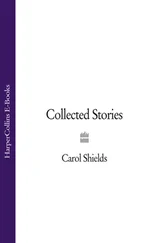Carol Shields - Unless
Здесь есть возможность читать онлайн «Carol Shields - Unless» — ознакомительный отрывок электронной книги совершенно бесплатно, а после прочтения отрывка купить полную версию. В некоторых случаях можно слушать аудио, скачать через торрент в формате fb2 и присутствует краткое содержание. Жанр: Современная проза, на английском языке. Описание произведения, (предисловие) а так же отзывы посетителей доступны на портале библиотеки ЛибКат.
- Название:Unless
- Автор:
- Жанр:
- Год:неизвестен
- ISBN:нет данных
- Рейтинг книги:4 / 5. Голосов: 1
-
Избранное:Добавить в избранное
- Отзывы:
-
Ваша оценка:
- 80
- 1
- 2
- 3
- 4
- 5
Unless: краткое содержание, описание и аннотация
Предлагаем к чтению аннотацию, описание, краткое содержание или предисловие (зависит от того, что написал сам автор книги «Unless»). Если вы не нашли необходимую информацию о книге — напишите в комментариях, мы постараемся отыскать её.
Unless — читать онлайн ознакомительный отрывок
Ниже представлен текст книги, разбитый по страницам. Система сохранения места последней прочитанной страницы, позволяет с удобством читать онлайн бесплатно книгу «Unless», без необходимости каждый раз заново искать на чём Вы остановились. Поставьте закладку, и сможете в любой момент перейти на страницу, на которой закончили чтение.
Интервал:
Закладка:
A high school in Ontario is named after her, and in France, in the small city of Mâcon, there is a Danielle Westerman Square, a surprisingly beautiful public space with linden trees and cobbled paths, where, when Tom and I walked there early last March, we seemed to move through the drifts of perpetual springtime, as though the people passing us, families, old people, had never known a time of fixed gloom or shame, that they had never been without the filtering, healing buzz of warm sunshine.
In her last years Danielle has become cranky, even with me, her translator. She suspects I’ve abandoned the “discourse,” as she always calls it, for the unworthiness of novel writing.
She has a way of lowering her jaw when she skirts this topic, and her eyes seem freshened with disappointment. She is such a persuasive force that I often find myself agreeing with her; what really is the point of novel writing when the unjust world howls and writhes?
Novels help us turn down the volume of our own interior “discourse,” but unless they can provide an alternative, hopeful course, they’re just so much narrative crumble. Unless, unless.
Unless is the worry word of the English language. It flies like a moth around the ear, you hardly hear it, and yet everything depends on its breathy presence. Unless — that’s the little subjunctive mineral you carry along in your pocket crease. It’s always there, or else not there.
(If you add a capital s to unless, you get Sunless, or Sans Soleil, a very odd Chris Marker film.)
Unless you’re lucky, unless you’re healthy, fertile, unless you’re loved and fed, unless you’re clear about your sexual direction, unless you’re offered what others are offered, you go down in the darkness, down to despair. Unless provides you with a trapdoor, a tunnel into the light, the reverse side of not enough. Unless keeps you from drowning in the presiding arrangements. Ironically, unless, the lever that finally shifts reality into a new perspective, cannot be expressed in French. À moins que doesn’t have quite the heft; sauf is crude. Unless is a miracle of language and perception, Danielle Westerman says in her most recent essay, “The Shadow on the Mind.” It makes us anxious, makes us cunning. Cunning like the wolves that crop up in the most thrilling fairy tales. But it gives us hope.
At eighty-five, she’s not quite lost her superstitious hold on the belief in bad luck and good luck. She’s had enough of both bad and good, so that even when occupied with changing the world, she comes on like an old-style Presbyterian, accepting her mixed lot. Her new book is selling briskly everywhere, praised for its originality and sinewy analysis. No author tour, hardly any advertising, but such a response. We talk about the reviews today over our smoked salmon and devilled eggs. Oh, what a thick, rich pile of reviews, one of them referring to the
“incantatory” flow of the prose — I like that — and another claiming Danielle as a National Treasure — an epithet that makes her squirm slightly but to me signals her earned authority.
After a while we get on to the subject of how we carry a double history in our heads, what is and what could be, and how we must try to keep them from inflating or deflating each other.
She has deleted the early roots from her life, or pretends to have done so. Papa worked for the post office in Mâcon, Maman in a bar in La Roche-Vineuse. Their appartement in this village was three rooms in a house on rue des Allemagnes. She refuses to speak of those days (though she did not hesitate to recommend La Roche as a tourist destination). She stored up her energy of repression in her early years and decided to spend it somewhere else. There must have been a day, a moment, when this decision was made. “They’re dead,” she says, meaning either her parents or the early years. And she adds: “To me they’re dead.” Her memoirs begin when she is eighteen, in Paris. She had passed her baccalaureate, boarded a train, and enrolled at the Sorbonne. So much for childhood. Miraculously, she has got away with this sketch of a life, so far at least.
“How do you bear it?” I ask her today. I’ve already told her about the New York editor who has bullied me into sending my half-finished manuscript to him. I’ve told her about seeing Norah early this morning, how instead of sitting on the pavement she was on her feet, pacing between the subway exit and the bus stop, back and forth, back and forth, her hands jammed into her jacket pockets, her neck bent against the cold, her sign, GOODNESS, hanging crookedly on a string around her neck. I told her about how, last Saturday, Natalie and Chris had decided not to go into Toronto to be with their sister; it was too cold, they said, a little too casually, and there was a volleyball tournament in Orange-town. And finally I’ve told her about the bitter disappointment I experienced reading The Goodness Gap and the letter I dashed off to its unreconstructed author.
“And did you mail this letter?”
“Well, no.”
“Ah!”
I explain to her that I sometimes don’t believe what I write. I can’t rely on my own sallies and locutions, my takes on the immediate and devastating circumstances. Often, the next day, looking at what I’ve written, I’m left shaking my head: Who is the self-pitying harridan who has put down such words, who is the person writing pitiful letters to strangers? Last week, at a party, I was introduced to Alexander (Sandy) Valkner, to whom I had “written” a scolding letter, and found him to be humble, courteous, and kind.
So who is this madwoman, constructing a tottering fantasy of female exclusion and pinning it on her daughter? Often — I don’t tell Danielle this — I don’t bother to put the words down at all — I think my letters line by line, compose them in my head as I dust under the beds. That’s enough to keep me sane. Yet I need to know I’m not alone in what I apprehend, this awful incompleteness that has been alive inside me all this time but whose name I don’t dare say. I’m not ready to expose myself.
Does Danielle really get it? I thought she did, but now I’m not sure.
She shrugs her beautiful shrug. Thin shoulders, rather narrow, a blue wool knitted vest that should be replaced. A silver bangle on a wrist that looks like it’s made of old wax, three silver rings, loose on her bony hands. Her beautifully kept nails are long and crimson. How does she bear it? All the words she’s written, all the years buried inside her. What does her shelf of books amount to, what force have these books had on the world?
How do you bear it? I wait for an answer, but none is forthcoming. Tell me, tell me, give me an answer. Give me an idea that’s as full of elegance and usefulness as the apple orchard behind my house, something from which I can take a little courage. She shrugs again. For a split second I interpret this as a shrug of surrender. But no. To my surprise, she breaks suddenly into a bright smile, her false teeth gleaming like tiles. And then, slowly, making a graceful arc in the air, she salutes me with her glass of tea.
Toward
On a December morning I went walking hand in hand with Tom in the Orangetown cemetery.
God knows what we were looking for; it didn’t matter, we were here, together, walking and talking. The cold weather had broken, and the tops of the old limestone monuments, sun-plucked in their neat rows, were shiny with melting snow. We wore light jackets and rubber boots. The alignments of stone whisper: quiet, please. This is something we often do on a Sunday afternoon, not out of morbidity but just wanting a quiet place. We’re almost always the only ones here. Years ago, people visited cemeteries regularly, tending graves and supplying them with memorial flowers, uttering words of greeting to those who lay beneath the ground, just as though they believed the dead were really present, just inches away, and eager for a little human conversation. The Orange-town cemetery, cooled by stone on the hottest day, is famous for the quality of its lawn care and the eccentricity of its engravings.
Читать дальшеИнтервал:
Закладка:
Похожие книги на «Unless»
Представляем Вашему вниманию похожие книги на «Unless» списком для выбора. Мы отобрали схожую по названию и смыслу литературу в надежде предоставить читателям больше вариантов отыскать новые, интересные, ещё непрочитанные произведения.
Обсуждение, отзывы о книге «Unless» и просто собственные мнения читателей. Оставьте ваши комментарии, напишите, что Вы думаете о произведении, его смысле или главных героях. Укажите что конкретно понравилось, а что нет, и почему Вы так считаете.












